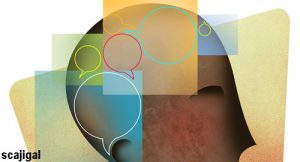 ATLANTA—In a session titled Mechanisms & Mediators of Psychiatric Co-Morbidity in Rheumatology at the 2019 ARP/ARC Annual Meeting, speakers said rheumatic disease affects not just the body, but can also compound psychiatric disturbances, including depression, anxiety, insomnia, fatigue and cognitive impairment, possibly making the underlying disease even worse.
ATLANTA—In a session titled Mechanisms & Mediators of Psychiatric Co-Morbidity in Rheumatology at the 2019 ARP/ARC Annual Meeting, speakers said rheumatic disease affects not just the body, but can also compound psychiatric disturbances, including depression, anxiety, insomnia, fatigue and cognitive impairment, possibly making the underlying disease even worse.
Daniel Albert, MD, professor of medicine and pediatrics at The Dartmouth Institute for Health Policy and Clinical Practice, Dartmouth University, Hanover, N.H., emphasized that psychosocial stressors and inflammation, if untreated, can feed off each other. This means stress or depression due to rheumatic disease can adversely affect therapy effectiveness, which in turn can make the psychosocial stressors worse, thus becoming a self-feeding and circular conundrum.
“It is the 800 lb. gorilla in the room, because therapies do not work as well when co-morbid psychiatric disorders are left unaddressed,” said Dr. Arnold. “Actually, it’s probably more like an 8,000 lb. elephant.”
Depression and anxiety symptoms should serve as markers to manage, monitor and prevent exacerbation of these conditions. “Unfortunately, recognition and initial management of psychiatric issues is not taught in most rheumatology fellowships,” Dr. Albert said. “There should be a groundswell of interest in this topic, and the training program guidelines [should] introduce this topic to our trainees, because they certainly need it.”
Psychiatric Disease Is Undertreated
Psychiatric disorders are common and elevated in patients with rheumatoid arthritis (RA). Dr. Albert said the overall prevalence of anxiety disorders among RA patients is 16.8%, about three times greater than reported among the general population.1,2
Compared with the general population, incidence rate ratios for depression (1.46), anxiety disorder (1.24) and bipolar disorder (1.20) are elevated in patients with RA.3 “Interestingly,” Dr. Albert said, “The incidence rate ratio for schizophrenia in RA patients is reduced (0.96).”4
Studies also suggest stress in the form of anxiety disorders was associated with an increased incidence of autoimmune disease.5 “At a minimum, one out of five rheumatology patients—possibly closer to one in three—has a significant psychiatric issue, and most have limited access to professional psychiatric care,” Dr. Albert said.
A recent study also implicated depression as a risk factor for systemic lupus erythematosus (SLE). According to the ACR, cognitive dysfunction is present in 20–80% of patients with SLE as a consequence of disease, depression or medications, especially corticosteroids. Also, anxiety disorders are present in 24% of patients with SLE, and depression is present in 39% of patients with SLE.6
Andrew H. Miller, MD, the William P. Timmie Professor and vice chair for research in the Department of Psychiatry and Behavioral Sciences, Emory University School of Medicine, Atlanta, said, “[Although] there are impressive data that show a relationship between inflammation and depression, only a subgroup of depressed patients exhibits increased inflammation—about 30%, depending on the population.”7
Increased inflammation affects specific neurotransmitter systems and many behavior disorders, Dr. Miller said. He also noted the importance of neurotransmission to mood regulation has led to the investigation of inflammation and inflammatory cytokines on serotonin, noradrenaline and dopamine levels, and also on the excitatory amino acid glutamate. In a study he led that appeared in Nature Reviews Immunology, he wrote, “There are several pathways through which inflammatory cytokines can lead to reduced synaptic availability of these monoamines, which is believed to be a fundamental mechanism in the pathophysiology of depression.”8
Mind-Generated Solutions
Afton L. Hassett, PsyD, associate research scientist in the Department of Anesthesiology and director of the university’s clinical pain research in the Back & Pain Center, University of Michigan, Ann Arbor, focused on how RA may adversely affect a patient’s mood and behavior. “What’s important,” she said, “is how we react [to the pain]. Do we bounce back, or are we bowled over?”
Numerous studies link negativity to key factors in chronic pain. Dr. Hassett said that compared with more positive people, those who think negatively tend to have:
- Higher clinical pain intensity;
- Higher pain reports;
- Worse weekly pain;
- Lower pain tolerance;
- Increased experimental pain sensitivity;
- Reduced tolerance to pain;
- Increased hyperalgesia;
- Greater use of pain medication;
- Increased analgesia;
- Greater pain-related disability;
- Increased fatigue;
- More physical symptoms;
- Greater impact of pain on cognition;
- Higher levels of psychiatric co-morbidity;
- Poorer quality of life; and
- Poorer self-efficacy for pain management.9–12
Dr. Hassett said it’s important for arthritis patients not to focus on the negative. “We psychologists and psychiatrists are fantastic at measuring negative symptoms. We’re great at understanding anxiety and depression and the impact of all these other negative emotions. And they’re important, because even in the area of pain, they’re very nicely related to all of the things we want to avoid. So patients who are depressed or anxious are more likely to higher pain report, use more medications and have greater levels of disability.”
A better approach is to not let patients wallow in their fears and other negative thought patterns. “We as humans are more than negative emotions; we are also full of positive emotions, and we’re resilient,” said Dr. Hassett.
People who tend to be resilient share certain characteristics. In general, they have positive self-images, have social support and other positive relationships, and have developed and use coping and problem-solving skills. They also have positive emotions. “They’re not just happy but also courageous,” said Dr. Hassett.
Resilient people also have good communication skills. “They talk to others when bad things happen,” said Dr. Hassett, and keep things in perspective. “They do downward social comparisons, including gratitude for what’s not wrong or bad in their lives.”
Besides a tendency to be optimistic, Dr. Hassett said resilient people never stray too far from what they see as their sense of purpose. “They tend to understand who they are and where they’re going; things are meaningful to them.”
Dr. Hassett said her clinic uses positive activity interventions to help patients overcome anxiety and depression and other negative patterns. These include asking patients to keep a gratitude diary and to recognize and list their character strengths. Each day, patients are asked to write down their top seven strengths.
“Everyone has strengths,” said Dr. Hassett. “People may need to be reminded what their strengths are.”
Along with keeping the diary, patients must use one of their strengths in a way they have not done before every day for a week. “Each night they write down how they used one of their strengths that day, including how they felt before, during and after the activity, and whether they planned to repeat it in the future,” said Dr. Hassett.
Another exercise she recommends: Patients should send texts to people they haven’t been in touch with for quite a while. “If, out of the blue, you tell someone you’re thinking about them, you’ll be surprised by what happens afterward.”
Mike Fillon is a healthcare writer living in the Atlanta area.
References
- Euesden J, Matcham F, Hotopf M, et al. The relationship between mental health, disease severity, and genetic risk for depression in early rheumatoid arthritis. Psychosom Med. 2017 Jul/Aug;79(6):638–645.
- Major depression. National Institute of Mental Health, National Institutes of Health. 2019 Feb.
- Matcham F, Rayner L, Steer S, Hotopf M. The prevalence of depression in rheumatoid arthritis: A systematic review and meta-analysis. Rheumatology (Oxford). 2013 Dec;52(12):2136–2148.
- Demmelmaier I, Pettersson S, Nordgren B, et al. Associations between fatigue and physical capacity in people moderately affected by rheumatoid arthritis. Rheumatol Int. 2018 Nov;38(11):2147–2155.
- Matcham F, Ali S, Irving K, et al. Are depression and anxiety associated with disease activity in rheumatoid arthritis? A prospective study. BMC Musculoskelet Disord. 2016 Apr 11;17:155.
- Roberts AL, Kubzansky LD, Malspeis S, et al. Association of depression with risk of incident systemic lupus erythematosus in women assessed across 2 decades. JAMA Psychiatry. 2018 Dec 1;75(12):1225–1233.
- Raison CL, Rutherford RE, Woolwine BJ, et al. A randomized controlled trial of the tumor necrosis factor antagonist infliximab for treatment-resistant depression: The role of baseline inflammatory biomarkers. JAMA Psychiatry. 2013 Jan;70(1):31–41.
- Miller AH, Raison CL. The role of inflammation in depression: From evolutionary imperative to modern treatment target. Nat Rev Immunol. 2016 Jan;16(1):22–34.
- Seligman MEP, Rashid T, Parks AC. Positive psychotherapy. Am Psychol. 2006 Nov;61(8):774–788.
- Hassett AL, Goesling J, Mathur SN, et al. Affect and low back pain: More to consider than the influence of negative affect alone. Clin J Pain. 2016 Oct;32(10):907–914.
- Hassett AL, Fisher JA, Vie LL, et al. Association between predeployment optimism and onset of postdeployment pain in U.S. Army soldiers. JAMA Netw Open. 2019 Feb 1;2(2):e188076.
- Bolier L, Haverman M, Westerhof GJ, et al. Positive psychology interventions: A meta-analysis of randomized controlled studies. BMC Public Health. 2013;13:119.

